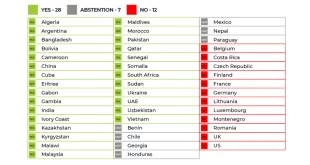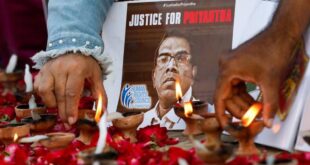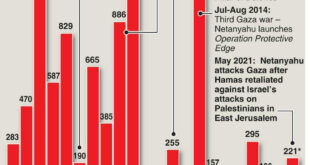UNITED NATIONS, Sep 20, 2011 (IPS) – As the United Nations celebrated the birth of a new democratic Libya, the National Transitional Council (NTC), which has been duly recognised as the legitimate government, is faced with new political demands – even before it could get off the ground.
 The Libyan government is expected to be under pressure to right the wrongs of the past, including the creation of multi-party democracy, introducing constitutional reforms, radically overhauling the country's judicial system, and establishing a new human rights regime.
The Libyan government is expected to be under pressure to right the wrongs of the past, including the creation of multi-party democracy, introducing constitutional reforms, radically overhauling the country's judicial system, and establishing a new human rights regime.
Last Friday, the 193-member General Assembly overwhelmingly voted – 114 in favour to 17 against, with 15 abstentions – to accept the credentials of the new Libyan leadership.
"Today, we are honoured to formally welcome them into the international community and to this first major meeting at the United Nations," Secretary-General Ban Ki-moon told Tuesday's high-level meeting on Libya.
U.S. President Barack Obama singled out the success of the NATO- backed Libyan rebels as an example of "how the international community should work in the 21st century, with more nations bearing the responsibility and costs of meeting global challenges".
This, he pointed out, is the very purpose of the United Nations. "So every nation represented here today can take pride in the innocent lives we saved and in helping Libyans reclaim their country. It was the right thing to do," he told delegates.
At the same time, he said, "Libya is a lesson in what the international community can achieve when we stand together as one."
"We cannot and should not intervene every time there's an injustice in the world," Obama cautioned.
Addressing the high-level meeting, the U.N. secretary-general said the National Transitional Council has already outlined its basic requirements in several critical areas.
These include the political and electoral process, constitutional reform, public security, human rights, transitional justice, rule of law, gender equality, reconciliation, reconstruction and economic recovery.
Ban said his new Special Representative for Libya, Ian Martin, and his team is already working out the logistical details.
Last Friday, the Security Council authorised the establishment of the new U.N. Support Mission (UNSMIL) in Libya.
Asked what effective role the United Nations can play in Libya, Philippe Bolopion, United Nations director at Human Rights Watch, told IPS: "We do believe that the U.N. can play a key role in ensuring the new Libya will be a rights-respecting country."
He said the U.N.'s expertise in justice, rule of law or protection of vulnerable groups will be particularly needed.
"As far as what the future of Libya holds after the dust settles in, I would not venture into making any prediction, but there is no doubt the help and vigilance of the international community will be much needed to avoid repeating the abuses of the past," he added.
Other groups, such as Amnesty International, have said that evidence exists of potential war crimes on both sides, and have urged the NTC to permit an independent investigation of the charges.
In a statement released Tuesday, Bolopion also said the U.N. could start by pressing the new authorities to protect African migrants, ensure justice and not revenge, cooperate with the International Criminal Court, and ensure a fair representation for women in decision-making.
As world leaders celebrate the birth of a new Libya, he said, this time around they should make it their priority to help build a state based on respect for human rights and the rule of law.
After paying a tribute to the thousands of civilians who fought for their freedom, Norwegian Prime Minister Jens Stoltenberg said both Norway and Libya are major oil and gas producing countries.
Norway has particular expertise in financial and resource management in the petroleum sector.
"The basis for our own policies is that these resources and the income they generate must benefit the people," he said.
He told the president of the Libyan National Transitional Council, Mustafa Abdel Jalil, one of the participants in the high-level meeting, that Norway is ready "to engage and to share with you our experience and best practices".
He also announced that the 370 million dollars of frozen Libyan assets in Norwegian accounts have now been released and can be used to meet more urgent needs.
Rev. Gabriel Odima, president of the Africa Center for Peace & Democracy, told IPS the Libyan situation is going to be a real challenge to the U.N. and the people of North Africa.
The world is now closely inter-related and the interests of a people in one country are no longer theirs alone, he said.
Outside or foreign interests in a country without coherent policies brings to the country either much good or much havoc or a mixture of both, he said.
The cause of democracy and the enjoyment by the citizens of human rights and freedoms in Libya have suffered and will continue to suffer so long as U.N. mandate on Libya is not clearly defined, Odima added.
The U.N. should take a strong leadership role to help the people of Libya move towards a democratic society and develop effective methods of aiding democracy in Libya, he told IPS. And most importantly, he pointed out, the U.N. should develop a blueprint – on the lines of the European Marshall Plan – for the reconstruction of Libya.
"Give the people of Libya the voice to govern their country and to manage their oil resources," he said.
The move by the West to support the liberation of Libya should not only stop with Muammar el-Gaddafi, but should extend to remove African dictators who have continued to abuse office and kill their own citizens, he declared.
 Sri lanka Muslims Web Portal Diversity and Inclusiveness
Sri lanka Muslims Web Portal Diversity and Inclusiveness



